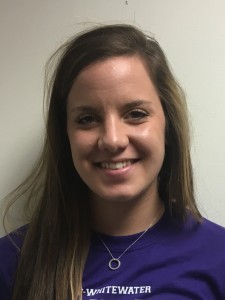 The Undergraduate Program would like to recognize the work of one of our student researchers, Alyssa Fernandez. Recently, Alyssa was informed that the research she has been conducting with her mentor, Dr. Pete Killoran, is going to be published and will be occupying an entire chapter of a book regarding the Eastern States Mental Institution.
The Undergraduate Program would like to recognize the work of one of our student researchers, Alyssa Fernandez. Recently, Alyssa was informed that the research she has been conducting with her mentor, Dr. Pete Killoran, is going to be published and will be occupying an entire chapter of a book regarding the Eastern States Mental Institution.
Alyssa is entering her fourth year at UWW, with a double major in Chemistry and Criminology and a minor in Biology, as well as pursuing a certification in Forensic Science. She received a Summer Undergraduate Research Fellowship grant in order to pursue her research in the fields of Forensic Anthropology and Biology.
Alyssa is working with Dr. Killoran, a faculty lecturer from the Sociology, Criminology, and Anthropology department here at UWW. Their research focuses around the remains of patients buried at the Eastern States Cemetery in Lexington, Kentucky.
“Eastern States was a mental hospital that was open in the early 1800’s and closed around the turn of the century. During this time there were very few restrictions and practically no oversight on the ingredients going into medication. Some patients who were deemed mentally ill were given a patent medicine called Calomel. Calomel contained extremely high levels of mercury and other heavy metals, which in turn made the patients more and more ill.”
Research continues to be conducted on the daily life and health of patients at Eastern States, ever since the cemetery was discovered. Alyssa and Dr. Killoran hope to fill in a gap in the research regarding the long term health of the patients as well as the affects that the medicine, specifically Calomel, had on them. The patients receiving this drug were ingesting 4000 times the current EPA ingestion limit of Mercury.
Over the summer, Alyssa and Dr. Killoran travelled to Kentucky with Whitewater’s X-Ray Fluorescence (XRF) apparatus, using it on bone and teeth samples to capture and record energy bursts unique to specific elements.
“With the use of the XRF we were able to see small spikes of Mercury, Arsenic, Strontium, and other elements within some of the Eastern States’ samples.”
After they returned to Whitewater with very small samples, Alyssa began to work with Dr. Ejnik of UWW’s Chemistry Department to test them. The tests they are conducting will enable them to detect more exact amounts than what was measured in the field.
Alyssa and Dr. Killoran’s research will help to give scientists a much broader view into the life and death of the patients at Eastern States. Their research also gives us a look into the resilience of the human body.
“The idea that the Eastern States’ Patients were ingesting such high doses of Mercury and other heavy metals multiple times per day and were able to survive long enough to absorb into their bones is astounding.”
Alyssa presented her research at Fall Undergraduate Research day, and has also been asked to present to the Dean’s Advisory Board. She plans to continue her undergraduate research until May of 2018, after which she hopes to attend graduate school to pursue a Ph.D. in either Biochemistry or Analytical Chemistry.
Getting something published is an amazing feat and Alyssa has demonstrated that through hard work and dedication to research, it is possible for an Undergraduate student to get work published.
“Having the opportunity to have my work published is truly amazing. Not only has this research alone opened so many doors for me, but being able to be published before finishing my Undergrad is absolutely incredible.”
For those who are interested in getting their own work published, Alyssa stresses the importance of making connections with professors.
“I made a connection with Dr. Killoran by occasionally stopping by his office just to say hi or to have a quick chat, asking questions and participating in class, and showing a genuine interest in the topics that we learned in class. Because of these things, Dr. Killoran approached me and asked me if I would be interested in being a part of this research opportunity.”
Making connections with professors is important for many aspects of undergraduate life, and can open up great opportunities and lead to great advice.
“There is no one better to talk to about jobs, careers, research and/or graduate school than someone who has already experienced it.”
If you are interested in learning more about Alyssa’s research, be sure to look out for the upcoming publication!
(All quotes provided by Alyssa Fernandez)

Great job Alyssa! 🙂